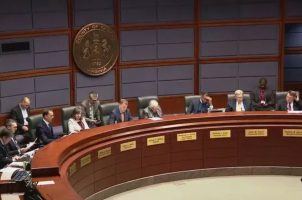New York Sets Final Tax Rates for Online Sports Betting; Amended Bids Due Monday
Posted on: October 20, 2021, 09:50h.
Last updated on: October 20, 2021, 10:21h.
New York has moved one step closer to rolling out statewide mobile sports betting. But questions still remain about the number of operators that will be selected and just how high the tax rate will go.

Tom Precious, Albany bureau chief for The Buffalo News, posted a series of tweets Tuesday that revealed the New York State Gaming Commission (NYSGC) notified remaining bidders for the online sports betting solicitation that the final tax rate matrix has been established.
The matrix is a table that has established proposed rates based on the number of platform providers and sports betting operators selected for award. Per the request for proposal solicitation released in July, the NYSGC will select a minimum of two platform providers and four operators. It is possible for companies to serve in both capacities.
NYS regulators have come up with a "final tax rate matrix" that mobile sports betting bidders must be able to meet. Bidders given til next Monday, 5pm, to amend their proposals if their plans don't match the tax rate levels.
— Tom Precious (@TomPreciousALB) October 19, 2021
Precious received a copy of a letter Gaming Commission Secretary Kristen Buckley sent to the bidders. The note advised them they have until 5 pm ET next Monday, Oct. 25, to conform their bid to match the matrix created by the commission’s evaluation committee.
In order for bidders to be considered for an award, they must agree to the proposed tax rates or be disqualified. The letter also indicates that applicants that consider their proposal to meet the required rates do not need to submit an amended proposal.
New York Tax Rate Could Be 64 Percent
According to a copy of the matrix that Precious posted on the social media site, the highest tax rate possible would be 64 percent of gross gaming revenue. That would happen if the gaming commission selected only one of the two largest applications as the only winner.
Those applications are the FanDuel-led proposal that includes Bally Bet, BetMGM, and DraftKings, and the Kambi proposal featuring Rush Street Interactive, Caesars Sportsbook, WynnBet, Resorts World, and PointsBet.
Of those, only Resorts World and Rush Street are strictly operators. Kambi would serve as the platform provider for Rush Street, and PointsBet would serve as the provider for Resorts World. PointsBet and the remaining companies in those two applications are proposing to serve as both platform providers and operators.
If the state selected both applications, the tax rate would be 51 percent.
The rate would go to 50 percent if the gaming commission also awarded licenses to a second Kambi proposal where the European gaming company would serve as the platform provider for Barstool Sportsbook and Fanatics, the sports online retailer looking to get into gaming.
Sorry, just catching up, but here is the full letter, sent this AM, from @NYSGamingComm to mobile sports betting bidders: pic.twitter.com/Dkf1IagmMO
— Tom Precious (@TomPreciousALB) October 19, 2021
Finding the Magic Numbers
The state would apply a 50 percent rate for up to 12 operators. That would allow for one of the three remaining one platform/one operator applications to also get an award if they were deemed a qualified applicant. Those three bids were submitted by bet365, FOX Bet, and theScore Bet.
While a 50 percent tax rate would be the highest sports betting tax in a non-lottery run state, the state is also offering a 10-year license for that rate. A tax rate between 30 and 50 percent would mean licenses run for five years.
If the state were to award licenses to cover 13 or all 14 operators (which would be either 11 or all 12 platform providers – provided all bidders have made it to this stage), the tax rate would be 35 percent. While Andrew Cuomo is no longer governor, this sports betting concept was his plan, and he made it a point to call for a tax of at least 50 percent on revenues.
The longer license would be desirable for companies even with the 50 percent (or higher tax), because the platform providers must pay a $25 million licensing fee regardless of the term.
It’s also worth noting that accepting the final tax rate does not necessarily mean the applicant will receive a license.
The Committee may recommend award of additional licenses to Qualified Applicants, in addition to the Selected Applicants, if the Committee determines that such additional awards are in the best interests of the State,” the RFP states.
So, if awarding a license moved the tax rate from 64 percent to 51 percent or from 50 percent to 35 percent, the selection committee would likely need to show the state would not lose revenue as a result of the additional award. In some instances, the additional platform license fees may mitigate lost tax revenue.
Sports Betting Award Date Still Unknown
While applicants have until Monday afternoon to submit their bids. It’s still uncertain when awards will be made.
According to the time line listed in the budget bill, the selection process was to take no more than 150 days from the time the final application was received. Applications were due on Aug. 9. That would mean awards would have to be made by Jan. 6.
It also said that the selection of applicants considered for licensure would take place before Dec. 6, and the award of licenses would take place at the next commission meeting. That meeting has not yet been scheduled.
A spokesperson for the state tells Casino.org that the solicitation’s time line has not been changed and remains on the schedule listed within the document.
Related News Articles
Most Popular
This Pizza & Wings Costs $653 at Allegiant VIP Box in Vegas!
Sphere Threat Prompts Dolan to End Oak View Agreement
MGM Springfield Casino Evacuated Following Weekend Blaze
Atlantic City Casinos Experience Haunting October as Gaming Win Falls 8.5%
Most Commented
-
VEGAS MYTHS RE-BUSTED: Casinos Pump in Extra Oxygen
— November 15, 2024 — 4 Comments -
Chukchansi Gold Casino Hit with Protests Against Disenrollment
— October 21, 2024 — 3 Comments
















No comments yet